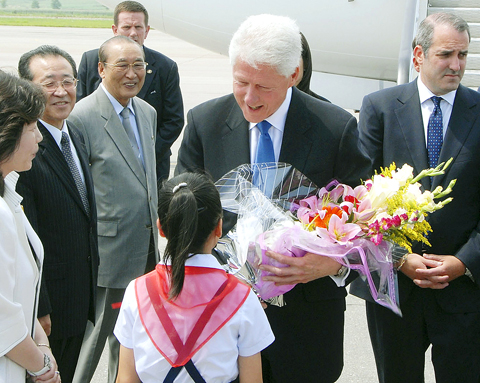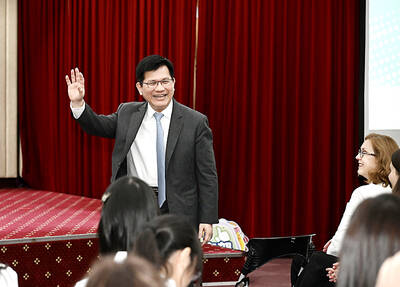North Korea welcomed former US president Bill Clinton to Pyongyang with flowers and hearty handshakes yesterday as he arrived on a surprise mission to bring home two jailed US journalists.
Clinton landed in an unmarked jet. On arrival he shook hands with North Korean Vice Foreign Minister Kim Kye-kwan and the deputy speaker of parliament.
Footage from TV news agency APTN showed Clinton bowing and smiling as a young girl presented him with flowers.

PHOTO: AP/KYODO NEWS
The unusually warm exchange between North Korean officials and the former leader of a wartime foe comes amid heightened tensions between the US and Pyongyang over the North’s nuclear program.
Clinton was making his first trip to North Korea in hopes of securing the release of Laura Ling (凌志美) and Euna Lee, reporters for former US vice president Al Gore’s California-based Current TV media venture who were arrested along the North Korean-Chinese border in March.
The visit could reap rewards beyond the women’s release, with Clinton and North Korean officials broaching the nuclear impasse, diplomatic relations and other long-standing issues, analysts said.
Kim also serves as North Korea’s chief nuclear negotiator.
“This is a very potentially rewarding trip. Not only is it likely to resolve the case of the two American journalists detained in North Korea for many months, but it could be a very significant opening and breaking this downward cycle of tension and recrimination between the US and North Korea,” Mike Chinoy, author of Meltdown: The Inside Story of the North Korean Nuclear Crisis, said in Beijing.
North Korea accused Ling, 32, and Lee, 36, of sneaking into the country illegally in March and engaging in “hostile acts,” and the nation’s top court sentenced them in June to 12 years of hard labor.
The US and North Korea do not have diplomatic relations, but officials were believed to be working behind the scenes to negotiate their release.
Clinton, Gore and New Mexico Governor Bill Richardson, who in the 1990s traveled twice to North Korea to secure the freedom of detained Americans, had all been named as possible envoys to bring back Lee and Ling. The decision to send Clinton was kept quiet.
A senior US official confirmed to reporters traveling to Africa with US Secretary of State Hillary Rodham Clinton that the former president was in Pyongyang to secure the journalists’ release, but said the White House would not comment until the mission was complete.
“While this solely private mission to secure the release of two Americans is on the ground, we will have no comment,” White House spokesman Robert Gibbs said in a statement. “We do not want to jeopardize the success of former president Clinton’s mission.”
North Korea’s official state media said leader Kim Jong-il met Clinton yesterday.
The Korean Central News Agency and other outlets reported the two men met in Pyongyang and that Clinton had “courteously” conveyed a verbal message from US President Barack Obama.
The report says Kim Jong-il expressed his thanks, and that the two shared a “wide-ranging exchange of views” at a dinner for Clinton at the state guest house.
In Washington, however, the White House was quick to say that Clinton had not carried a message from Obama for Kim Jong-il.
“That’s not true,” spokesman Gibbs told reporters.

FIREPOWER: On top of the torpedoes, the military would procure Kestrel II anti-tank weapons systems to replace aging license-produced M72 LAW launchers Taiwan is to receive US-made Mark 48 torpedoes and training simulators over the next three years, following delays that hampered the navy’s operational readiness, the Ministry of National Defense’s latest budget proposal showed. The navy next year would acquire four training simulator systems for the torpedoes and take receipt of 14 torpedoes in 2027 and 10 torpedoes in 2028, the ministry said in its budget for the next fiscal year. The torpedoes would almost certainly be utilized in the navy’s two upgraded Chien Lung-class submarines and the indigenously developed Hai Kun, should the attack sub successfully reach operational status. US President Donald Trump

Taiwan Semiconductor Manufacturing Co (TSMC, 台積電) is expected to start construction of its 1.4-nanometer chip manufacturing facilities at the Central Taiwan Science Park (CTSP, 中部科學園區) as early as October, the Chinese-language Liberty Times (the Taipei Times’ sister newspaper) reported yesterday, citing the park administration. TSMC acquired land for the second phase of the park’s expansion in Taichung in June. Large cement, construction and facility engineering companies in central Taiwan have reportedly been receiving bids for TSMC-related projects, the report said. Supply-chain firms estimated that the business opportunities for engineering, equipment and materials supply, and back-end packaging and testing could reach as high as

ALL QUIET: The Philippine foreign secretary told senators she would not respond to questions about whether Lin Chia-lung was in the country The Ministry of Foreign Affairs on Wednesday confirmed that a business delegation is visiting the Philippines, but declined to say whether Minister of Foreign Affairs Lin Chia-lung (林佳龍) is part of the group, as Philippine lawmakers raised questions over Lin’s reported visit. The group is being led by Deputy Minister of Agriculture Huang Chao-chin (黃昭欽), Chinese International Economic Cooperation Association (CIECA) chairman Joseph Lyu (呂桔誠) and US-Taiwan Business Council (USTBC) vice president Lotta Danielsson, the ministry said in a statement. However, sources speaking on condition of anonymity said that Lin is leading the delegation of 70 people. Filinvest New Clark City Innovation Park

TPP RALLY: The clashes occurred near the Chiang Kai-shek Memorial Hall on Saturday at a rally to mark the anniversary of a raid on former TPP chairman Ko Wen-je People who clashed with police at a Taiwan People’s Party (TPP) rally in Taipei on Saturday would be referred to prosecutors for investigation, said the Ministry of the Interior, which oversees the National Police Agency. Taipei police had collected evidence of obstruction of public officials and coercion by “disorderly” demonstrators, as well as contraventions of the Assembly and Parade Act (集會遊行法), the ministry said in a statement on Sunday. It added that amid the “severe pushing and jostling” by some demonstrators, eight police officers were injured, including one who was sent to hospital after losing consciousness, allegedly due to heat stroke. The Taipei